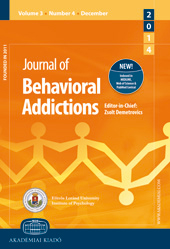Investigating Veterans’ Pre-, Peri-, and Post-Deployment Experiences as Potential Risk Factors for Problem Gambling
Investigating Veterans’ Pre-, Peri-, and Post-Deployment Experiences as Potential Risk Factors for Problem Gambling
Author(s): Seth W. Whiting, Marc N. Potenza, Crystal L. Park, Sherry A. McKee, Carolyn M. Mazure, Rani A. HoffSubject(s): Military history, Individual Psychology, Cognitive Psychology, Behaviorism, Substance abuse and addiction
Published by: Akadémiai Kiadó
Keywords: deployment experiences; gambling; military; veterans;
Summary/Abstract: Gambling disorder and its comorbid diagnoses are observed at higher rates in military veterans than in the general population. A significant research gap exists regarding the relationships of veterans’ life and service experiences to problematic gambling. The present study explored pre-, peri-, and post-deployment factors associated with problem gambling in veterans. Methods: Veterans of Operation Iraqi Freedom, Operation Enduring Freedom, and Operation New Dawn (n = 738; 463 males, and 275 females) completed questionnaires via structured telephone interview. We conducted bivariate and multinomial logistic regression analyses exploring associations among problem-gambling severity and socio-demographic variables, psychiatric comorbidities, and 10 scales of the Deployment Risk and Resilience Inventory measuring experiences pre-, peri-, and post-deployment. Results: Approximately 4.2% of veterans indicated at-risk or probable pathological gambling (ARPG) postdeployment (two or more DSM-IV criteria for pathological gambling). Bivariate analyses found more severe gambling in males, higher frequencies of post-traumatic stress disorder, substance dependence, traumatic brain injury, panic disorder, and depression in veterans with ARPG, and higher general harassment during deployment, and lower social support and more stressful life events post-deployment in those with ARPG. In multivariable models, both post-deployment factors remained significantly associated with ARPG. Discussion: The study suggests that problem gambling among veterans is related to service experiences, and particularly to life experiences post-deployment. Conclusions: Adverse service and life experiences and lack of social support may contribute to the risk of problem gambling in military veterans. Investigation of how Veterans Affairs clinical settings may serve veterans following deployment to prevent behavioral addictions is warranted.
Journal: Journal of Behavioral Addictions
- Issue Year: 5/2016
- Issue No: 2
- Page Range: 213-220
- Page Count: 8
- Language: English

